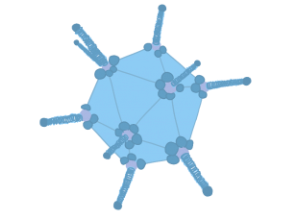News | Uncategorized
WU researchers develop intranasal vaccine

Charlotte Chen
Washington University researchers developed a COVID-19 vaccine administered via a nasal spray, or intranasal vaccine, that was authorized for use in India on Sept. 6.
The intranasal vaccine was developed primarily by David Curiel, Professor of Radiation Oncology, and Mike Diamond, Professor of Molecular Microbiology, Pathology, and Immunology, at the Washington University School of Medicine. Curiel said the intranasal vaccine could be even more effective than a traditional vaccine.
“The intranasal vaccine is a form of mucosal immunization,” Curiel said. “When a vaccine is given in a normal way, it generates antibodies in the blood — the antibodies aren’t necessarily at the body portals, like the nose. When you vaccinate at the nose, it’s specifically effective at the body portal and can block infection.”
Curiel also said there were many students who helped in the development of the intranasal vaccine, including postdoctoral research associate Ahmed Hassan.
Hassan said he was a veterinarian before working at the University, but while pursuing his Ph.D. at Purdue University he became interested in using adenovirus, a common virus that causes colds or the flu, to develop vaccines.
Hassan said he developed a vaccine for Zika virus through adenovirus sourced from gorillas, which leads to safer and more efficient vaccine development for humans. He also explained how his work with adenoviral based vaccines led to him getting involved with the University.
“I was pretty much spearheading the evaluation of the vaccine in animal models,” Hassan said. This work laid the foundation for Hassan’s work on generating animal models for the COVID-19 intranasal vaccine.
Curiel said the intranasal vaccines are more accessible to low-income communities, as the spray can be easily administered without the help of a medical professional.
“One of the advantages of intranasal is that you can traverse vaccine hesitancy and administering the vaccine can be done by non-healthcare professionals,” Curiel said.
The intranasal vaccine is being distributed in India through Bharat Biotech, a biotechnology company in India.
“We were looking for a partner to develop a clinical program rapidly and India has a number of very capable and ambitious vaccine production companies,” Curiel said.
Hassan said licensing to companies in countries such as the US will now be made easier as licenses already exist in countries like India which adds legitimacy to the product. He explained that it is easier to license a vaccine in a new country once another country has already rolled out the vaccine.
Hassan said countries like the US were not immediate intended targets for the intranasal vaccine.
“The main target for this vaccine was low- and middle-income countries like developing countries that need a vaccine to be really cost-effective and inexpensive,” Hassan said.
According to Curiel, intranasal vaccines aren’t new, but the pandemic stirred many more researchers to look at them. He added that currently the intranasal vaccine is only being looked at as a booster, as testing isn’t conclusive enough to support a base-line vaccine.
“Animal studies show that it could be used as a single intranasal administration, but we’d need human studies,” Curiel said. “The technology is early and it isn’t clear what the best way to employ it is, but the group in India is initially looking at it as a booster.”
Hassan also stressed the effectiveness of the intranasal vaccines.
“What we have shown in the studies, at least in the preclinical studies at WashU, is that the intranasal immunization is more effective at providing protection and more immunity if you will compare it to the intramuscular immunization,” Hassan said.
Curiel said that the University’s resources helped create the vaccine.
“Our institution has critical things: Mike Diamond, my work in viruses, our students,” Curiel said. “WashU has a critical mass of experts that we can pull together right here.”
